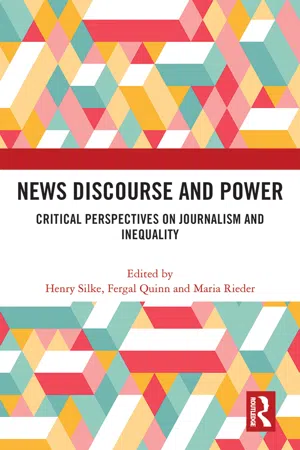
News Discourse and Power
Critical Perspectives on Journalism and Inequality
- 144 pages
- English
- ePUB (mobile friendly)
- Available on iOS & Android
News Discourse and Power
Critical Perspectives on Journalism and Inequality
About this book
The issue of socio-economic inequality has become an increasingly important question for journalism and the academy. The 2008 economic crisis and the years of austerity which followed exasperated class and regional division and as an even greater economic shock emerges from the aftermath of the Covid 19 pandemic, the role of journalism and the wider media in the production and reproduction of inequality assumes greater importance.
This edited collection includes eight chapters examining instances of where inequality is examined in the media, for example coverage of Thomas Piketty, precarity, corporate tax rates and race-, class- and gender-related issues, in order to address the following questions:
-
- Does journalism treat the issue of inequality in a satisfactory fashion?
-
- Does journalism challenge powerful interests, or does journalism play an ideological role in the reproduction of structures of inequality itself?
-
- How do increasingly poor working conditions of journalists impact on the coverage of inequality?
The chapters in this book were originally published as a special issue of the Critical Discourse Studies journal.
Frequently asked questions
- Essential is ideal for learners and professionals who enjoy exploring a wide range of subjects. Access the Essential Library with 800,000+ trusted titles and best-sellers across business, personal growth, and the humanities. Includes unlimited reading time and Standard Read Aloud voice.
- Complete: Perfect for advanced learners and researchers needing full, unrestricted access. Unlock 1.4M+ books across hundreds of subjects, including academic and specialized titles. The Complete Plan also includes advanced features like Premium Read Aloud and Research Assistant.
Please note we cannot support devices running on iOS 13 and Android 7 or earlier. Learn more about using the app.
Information
‘Piketty is a genius, but … ’: an analysis of journalistic delegitimation of Thomas Piketty’s economic policy proposals


Introduction
Capital in the twenty-first century and the Piketty debate
Social semiotics and critical intertextuality
Table of contents
- Cover
- Half Title
- Title Page
- Copyright Page
- Table of Contents
- Citation Information
- Notes on Contributors
- Introduction: Journalism, Discourse and the Reproduction of Inequality
- 1 ‘Piketty is a genius, but ... ’: an analysis of journalistic delegitimation of Thomas Piketty’s economic policy proposals
- 2 Denying, downplaying, debating: defensive discourses of inequality in the debate on Piketty
- 3 ‘Overpaid’ and ‘inefficient’: print media framings of the public sector in The Irish Times and The Irish Independent during the financial crisis
- 4 Cooking a corporation tax controversy: Apple, Ireland and the EU
- 5 Her name was Clodagh: Twitter and the news discourse of murder suicide
- 6 Discourses of tragedy: a comparative corpus-based study of newspaper reportage of the Berkeley balcony collapse and Carrickmines fire
- 7 Fake news? A critical analysis of the ‘Welfare Cheats, Cheat Us All’ campaign in Ireland
- 8 Narrowing the discourse? Growing precarity in freelance journalism and its effect on the construction of news discourse
- Index